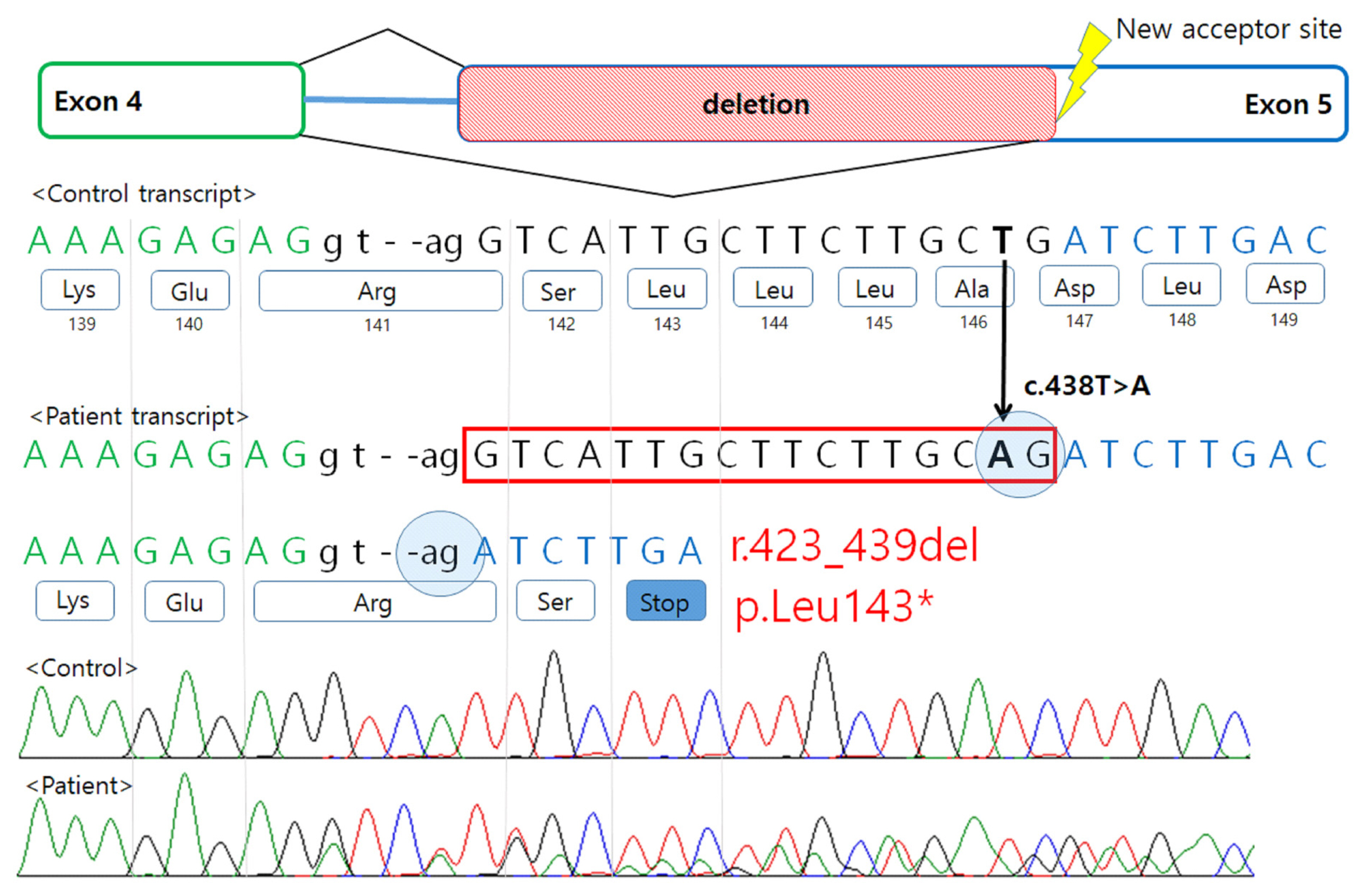Ann Lab Med.
2021 Jan;41(1):123-125. 10.3343/alm.2021.41.1.123.
A Novel Splice Variant (c.438T>A) of APC, Suspected by Family History and Confirmed by RNA Sequencing
- Affiliations
-
- 1Departments of Laboratory Medicine, University of Ulsan College of Medicine and Asan Medical Center, Seoul, Korea
- 2Departments of Gastroenterology, University of Ulsan College of Medicine and Asan Medical Center, Seoul, Korea
- 3Departments of Oncology, University of Ulsan College of Medicine and Asan Medical Center, Seoul, Korea
- 4Departments of Surgery, University of Ulsan College of Medicine and Asan Medical Center, Seoul, Korea
- KMID: 2512743
- DOI: http://doi.org/10.3343/alm.2021.41.1.123
Figure
Reference
-
1. Powell SM, Petersen GM, Krush AJ, Booker S, Jen J, Giardiello FM, et al. Molecular diagnosis of familial adenomatous polyposis. N Engl J Med. 1993; 329:1982–7.
Article2. Yurgelun MB, Allen B, Kaldate RR, Bowles KR, Judkins T, Kaushik P, et al. Identification of a variety of mutations in cancer predisposition genes in patients with suspected Lynch syndrome. Gastroenterology. 2015; 149:604–13.e20.
Article3. Richards S, Aziz N, Bale S, Bick D, Das S, Gastier-Foster J, et al. Standards and guidelines for the interpretation of sequence variants: a joint consensus recommendation of the American College of Medical Genetics and Genomics and the Association for Molecular Pathology. Genet Med. 2015; 17:405–24.
Article4. Nielsen M, Hes FJ, Nagengast FM, Weiss MM, Mathus-Vliegen EM, Morreau H, et al. Germline mutations in APC and MUTYH are responsible for the majority of families with attenuated familial adenomatous polyposis. Clin Genet. 2007; 71:427–33.5. Aretz S, Uhlhaas S, Sun Y, Pagenstecher C, Mangold E, Caspari R, et al. Familial adenomatous polyposis: aberrant splicing due to missense or silent mutations in the APC gene. Hum Mutat. 2004; 24:370–80.6. Anna A, Monika G. Splicing mutations in human genetic disorders: examples, detection, and confirmation. J Appl Genet. 2018; 59:253–68.
Article7. Vears DF, Niemiec E, Howard HC, Borry P. Analysis of VUS reporting, variant reinterpretation and recontact policies in clinical genomic sequencing consent forms. Eur J Hum Genet. 2018; 26:1743–51.
Article
- Full Text Links
- Actions
-
Cited
- CITED
-
- Close
- Share
- Similar articles
-
- Identification of a Novel Splice Variant (c.423-8A>G) of APC by RNA Sequencing
- Functional involvement of src and focal adhesion kinase in a CD99 splice variant-induced motility of human breast cancer cells.
- Whole-exome sequencing analysis in a case of primary congenital glaucoma due to the partial uniparental isodisomy
- De novo HCN1 Mutation Identified by Next-Generation Sequencing in a Patient with Early Infantile Epileptic Encephalopathy: Case Report
- A Case of Adenomatous Polyposis Coli


